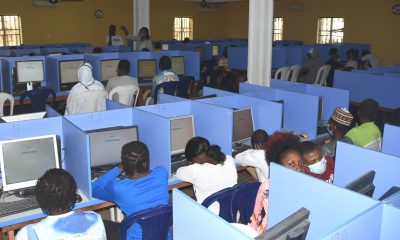Education
UTME: 28 Visually Impaired Candidates Write 2023 Exams in Ekiti

The Joint Admissions and Matriculations Board (JAMB) says 28 visually impaired candidates will be writing the examinations in Ekiti.
The JAMB representative, Prof. Rasheed Aderinoye, stated this at an opening ceremony organised by JAMB Equal Opportunity Group for visually impaired candidates on Thursday in Ado-Ekiti.
Aderinoye stated that the visually challenged candidates took the same test items as those who were not.
The don called on government to establish more special schools for the physically challenged students in Nigeria for equal rights.
He stressed the need for government at various levels to increase the establishment of schools for the physically challenged with a view to accommodating more special students across the country.
Aderinoye decried the situation, where most schools for the visually impaired and other challenges were privately owned, thereby denying most of the special students the opportunity to further their education.
He said the 2023 JAMB examinations for special candidates had commenced in eleven centres across the country.
He listed the states to include: Oyo, Lagos, Benin, Abuja, among others, where 360 candidates were accomodated, with only 28 writing their examination in Ekiti.
The JAMB representative noted that free accomodation, transportation, feeding and writing materials were provided for the special candidates having their exams in Ekiti State University, Ado Ekiti, covering the neighbouring states.
He maintained that the arrangements were to ensure that all physically challenged students were giving the opportunity to acquire tertiary education.
Wife of Ekiti Governor, Dr Olayemi Oyebanji, in her remarks, commended JAMB for equal opportunity to special candidates.
She said that such had contributed to promoting diversity, tolerance and acceptability among the physically challenged.
The governor’s wife noted that inclusive education was fundamental to human rights that every child deserved, which was crucial for development of the society.
She appealed to stakeholders in the education sector to continue to promote ideas that would allow students to thrive and reach their potentials.
The Vice Chancellor, Ekiti State University, Prof. Edward Olanipekun, represented by his Deputy (Academics) Prof. James Ayodele, urged stakeholders to ensure that every child had access to education regardless of their physical or mental ability.
The News Agency of Nigeria (NAN) reports that the event was attended by top government officials, including the Special Adviser to the Governor on Education, Dr Bimpe Aderiye.
Others are the Permanent Secretary ,Ministry of Education, Dr Folakemi Olomojobi and University senior lecturers, among other stakeholders in the education sector. (NAN)
Education
How female Medicine Degree Holder Abandoned Certificate for Carpentry- Bugaje

The Executive Secretary, National Board for Technical Education (NBTE), Prof. Idris Bugaje has expressed the need to promote inclusivity, especially for women and persons with disabilities in technical education.
Bugaje stated this in Abuja while assessing the impact of President Bola Tinubu’s administration after two years in office.
He appealed for greater gender inclusivity in vocational and technical education, stressing that deliberate policies such as scholarships and incentives could help bridge the gender gap.
In support of his position, Bugaje shared an inspiring story of a female medical doctor who abandoned her medical career to pursue carpentry.
“There is a story I want to share with you, about a girl who was interested in becoming a carpenter.
“The father was a carpenter and they were four children in the family, three boys and herself.
“Whenever she joined the boys to the workshop, the father would send her away, saying, `you are a girl, go back to the house, you are not supposed to be a carpenter’’.
“Without giving considerations to the passion of the young girl, the father sent her to a medical school.
“She graduated with the MBBS, went and did the one-year internship after graduation, and chose a role as a medical doctor.
“After that, she came back to the father, returned the MBBS certificate to him, and thanked him.
“Afterward, she told the father that her passion is in carpentry, not to practice as medical doctor,” Bugaje narrated
He added that after spending seven years on medical training, the father had no option but to send her to Turkey to learn how to make furniture.
Addressing cultural and societal barriers often faced by young women in technical fields, Bugaje appealed to parents to support their daughters’ interests in trades like plumbing, electrical installation, and carpentry.
He also called on policymakers to prioritise passion and skill development among youth, especially girls, noting that such encouragement could lead to greater innovation and self-reliance.
“If they want to become carpenters, ICT experts, or POP artists, allow them.
“In skills’ training, passion is very important. That’s what motivates children and helps them innovate.
“We need to harness these innovations if the country is to move forward and rise beyond being a third-world nation,” he said.
He emphasized the need to have deliberate policies to encourage women to come into TVET through scholarships and other incentives. (NAN)
Education
WAEC Apologies for Conducting English Exam Late, Cites Leakage Prevention

The West African Examinations Council (WAEC) has apologized for delay in conducting English Language Paper 2 in the ongoing 2025 West African Senior School Certificate Examination (WASSCE).
The took place on Wednesday evening.
In a statement by Moyosola Adesina, Acting Head of Public Affairs Department of
WAEC, the council said that it encountered challenges.
”While maintaining the integrity and security of our examination, we faced considerable challenges primarily due to our major aim of preventing leakage of any paper.
“We recognise the importance of timely conduct of examinations and the impact of this decision on candidates, their schools and parents, and we sincerely apologise for any inconveniences caused,” WAEC stated.
It said that it successfully achieved its objective but it inadvertently impacted the timeliness and seamless conduct of the examination.
“In spite of our best efforts, we encountered logistical hurdles, security concerns and socio-cultural factors that negatively influenced our operations,” WAEC said.
The council re-affirmed its commitment to upholding the highest standard in examination conduct, and pledged to continue to promote academic excellence. (NAN)
Education
FG vows full WAEC CBT shift by 2026 – Minister

The Minister of Education, Dr Tunji Alausa, has reaffirmed the Federal Government’s commitment to fully transitioning to Computer-Based Test (CBT) examinations for the West African Examinations Council (WAEC) and other exam bodies by 2026.
Dr Alausa made this known while monitoring the conduct of WAEC’s CBT examinations in Abuja on Wednesday.
He expressed optimism about Nigeria’s capacity to modernise its examination system and reduce widespread malpractice through digital innovation.
Commending WAEC’s initiative, the minister described the shift from traditional pen-and-paper exams to CBT as a historic and crucial step toward fairness and educational integrity.
“We are working very hard to eliminate fraud in our exam system, and WAEC is taking the lead,” he said.
Highlighting the advantages of CBT, Alausa noted that the system simplified the exam process while significantly curbing cheating.
“We now have clear evidence that when exams are done using technology, the level of fraud is minimised to almost zero,” he stated.
He further lauded WAEC’s internal safeguards, explaining that the CBT system was operated via a secured Local Area Network (LAN), making it “literally impossible” to hack.
According to the minister, by Nov. 2025, all WAEC multiple-choice exams will be conducted using CBT.
He added that essay questions and NECO examinations would follow suit by 2026.
On infrastructure and logistics, particularly in remote areas, Alausa acknowledged the challenges but assured that scalable solutions are in progress.
“Are we going to be ready to provide every single needed infrastructure by November? Absolutely not.
“But as we move into the future, we will be ready. We have to challenge ourselves as government,” he said.
He also addressed concerns over the logistics of conducting multiple exams.
“In WAEC, the average student takes about eight to nine papers.
“They do it over several days. Those are the logistics we, as administrators, have to work through, and we already are,” he explained.
The ongoing WAEC exams, which began on April 24, are scheduled to conclude on June 20, 2025.
A total of 1,973,253 candidates from 23,554 schools are participating. Of this number, 979,228 candidates are male, accounting for 49.63 per cent, while 994,025 candidates are female, making up 50.37 per cent.(NAN)



























